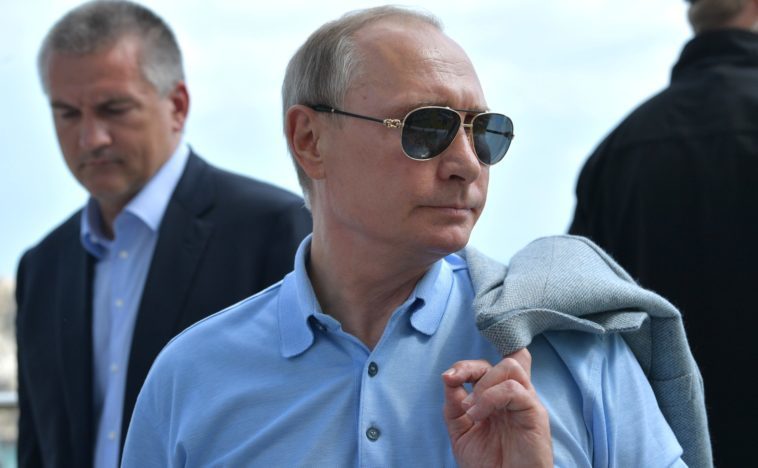MILAN, Italy — Italy’s administration of Prime Minister Giuseppe Conte is stepping up its pro-Russia push, and some experts worry that the Eurosceptic government is going really far with its Russophile bent.
Interior minister Matteo Salvini told Russian business leaders in Moscow on Oct. 17 that he felt “at home” in the Russian capital, unlike when he was in European Union (EU) countries.
The rightist Lega party leader known for his stance against the EU and immigrants even condemned the union’s sanctions against Russia over the annexation of parts of Ukraine as an “absurdity.”
Lega came to power following its strong performance in the March 2018 general election. The Conte administration, a coalition between Lega and the populist Movimento 5 Stelle (Five Star Movement), is eager to have the anti-Russia sanctions lifted, and has shown a more explicitly pro-Russian stance than any other fellow EU member states or G-7 countries.
Behind Lega’s pro-Russian inclinations stands Gianluca Savoini, 55, chairman of the Lombardia Russia Cultural Association in the northern Italian province of Lombardia, Salvini’s home turf.
Savoini has been fond of reading Russian literature since childhood and married a Russian woman. Believing that integration of Europe under the banner of the EU would “destroy the identity of Italians,” he helped form Lega Nord (Northern League), which has since been rebranded as Lega, in 1989.
Savoini admires Russian President Vladimir Putin as an ideal leader, lauding him as a “nationalist who protects Russia’s identity from the inflow of Islam and migrants,” he told the Mainichi Shimbun in an interview in Milan.
After the EU instituted sanctions against Russia in 2014 over its annexation of the Crimean Peninsula in southern Ukraine, Savoini visited the peninsula alongside Salvini to interact with pro-Russian local residents there. Upon returning to Italy, Savoini arranged a meeting between President Putin and Salvini at the former’s request.
Salvini favorably recalled the meeting. “It was a constructive and friendly discussion on issues including migrants,” he said. He subsequently made his pro-Putin stance even clearer. In 2017, Lega signed an agreement to collaborate with Putin’s United Russia party.
But why did Lega perform so well in the 2018 general election? Sergio Germani, director of the Gino Germani Institute of Social Science and Strategic Studies, an Italian think tank, says years of penetration of Russian “soft power” into Italy played a role.
In Italy, there is an abundance of free Russian lessons and budget tours to Russia offered by Russian organizations, helping make Italians feel closer to Russia than other Europeans do. Russian state TV channel RT is also familiar to viewers in Italy.
According to Germani, the contrasting image of corruption-riddled Italy vis-a-vis the country of the “great leader” Putin has spread across Italy. He explained that it is a result of Lega supporters and others dispersing biased news reports in favor of Russia via social media.
Now Lega is poised to join forces with a French far-right party and other pro-Russian groups in the European Parliament election slated for May 2019 to boost their strength in the legislature and possibly scrap the union’s anti-Russian sanctions.
There is also a historical factor in play behind this pro-Russian trend. Italy was once home to the largest communist party in Western Europe and has maintained political ties with the Soviet Union and its successor Russia. Italy has also counted on Russia for energy resources including gas for operating thermal power plants. These connections have driven Rome’s successive governments to maintain friendly relations with Moscow.
However, Nona Mikhelidze, a researcher at the International Affairs Institute, another Italian think tank, notes that the Conte administration is far more pro-Russian than any other Italian governments in the past.
While Italian leaders have traditionally followed an unwritten rule of choosing EU over Russia when faced with a choice between the two, Mikhelidze says, “There’s no telling which partner the current administration will turn to from here on out.”
Source: Mainichi
Image Courtesy:Sott
You may also like
-
Beware! Chinese Hackers are Using VLC Media Player to Spy on You
-
Israel Participates in US Mideast Naval Exercise wih Saudi Arabia and Oman – IMX 22
-
Pakistani Establishment Controlling ‘Family Business’ of Selling Kashmir Narrative, Uses Issue as Survival Strategy: Report
-
After Suspending Twitter ‘Indefinitely’, Nigerian Govt Joins Made-In-India Microblogging Platform ‘Koo’
-
Pam Gosal, First Indian-Origin Woman to be Scottish Lawmaker
